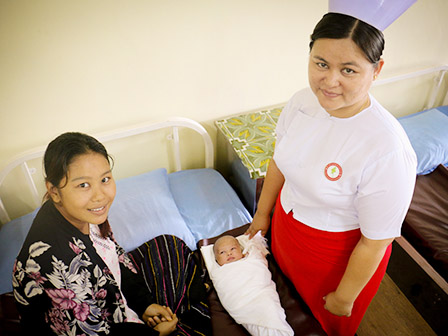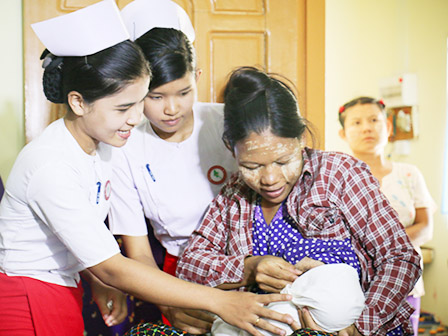Wearing the well-known red longyi’s and white hat, the symbol of Myanmar’s midwives, also referred to locally as the “Red Angels,” 22 years-old Ma Hnin Wai Wai Oo is one of a team of 130 UNFPA supported midwives in cooperation with the Myanmar Nurse and Midwife Association (MNMA). On May 5, she and three midwives are demonstrating practical hands-on training looking after mothers and newborns at the busy South Dagon maternal health clinic, located in the outskirts of Yangon. On average the maternal health clinic delivers approximately 30-50 babies on a monthly basis. UNFPA is contributing US$207,514 per year to help train and deploy newly graduated midwives to areas most in need.
Despite flashes from photographer’s cameras, Ma Hnin Wai Wai Oo remains calm and goes about her daily routine assisting her eight patients; four young first time mothers and their newborns. As today, May 5th is the International Day of the Midwife, the MNMA maternal health clinic has opened its door to a group of 19 excited journalists from various Myanmar media outlets to showcase the tireless work being carried out by the country’s hardworking and always smiling midwives.

Professor Daw Yin Mya, MNMA President gave the press an overview of the practical or pre-service midwifery training being carried out at the clinic in cooperation with UNFPA and the subsequent deployment. 130 midwives in total have so far been deployed to all of Myanmar’s states and regions, including hard to reach areas.
The 2014 Myanmar census, the country’s first in over three decades revealed that an estimate of 70% of the Myanmar’s 51.4 million population resides in rural areas, with limited access the basic health care or skilled birth attendants. An estimated 70% of deliveries take place at home and without the assistance of a skilled birth attendant. “UNFPA believes that investing in quality midwifery could help prevent about two thirds of maternal and newborn deaths which remain high in Myanmar with 200 maternal death per 100,000 live births,” said Dr. Hla Hla Aye.

At the clinic, the midwives are put through their paces receiving practical training on antenatal, delivery and post natal care, emergency obstetric care, post abortion care, prevention of mother to child transmission of HIV, minimum initial service package (MISP) for reproductive health in crisis situation and gender based violence, including family planning also referred to in Myanmar as birth-spacing.
Ma Aye Thandar Soe, 25 year-old first time mother gave birth to a 3,5 kilogram health baby girl. Prior to the delivery she and her husband, also 25 year-old, who works as a construction working in the area, visited the clinic six times for check-ups and to get advice from the midwives on how to take care of the baby and other practical ante-natal information, including options on family planning or birth spacing as it is referred to in Myanmar. “I decided to deliver the baby in clinic as it would be safer than delivering at home. I was happy with the service which we have received at the clinic the midwives are very polite and treat me with respect,” said Ma Aye Thandar Soe.
The International Day of the Midwife is observed globally on 5 May.


